

Thought disorder. In psychiatry, thought disorder (TD) or formal thought disorder (FTD) refers to disorganized thinking as evidenced by disorganized speech.[1] Specific thought disorders include derailment, poverty of speech, tangentiality, illogicality, perseveration, neologism, and thought blocking.[1] Psychiatrists consider formal thought disorder as being one of two types of disordered thinking, with the other type being delusions.
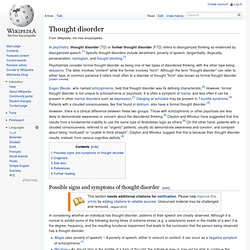
Solomon Shereshevsky. Solomon Veniaminovich Shereshevsky (1886–1958) (Russian: Соломон Вениаминович Шерешевский), also known simply as 'Ш' ('Sh') or 'S.', was a Russian journalist and mnemonist active in the 1920s.
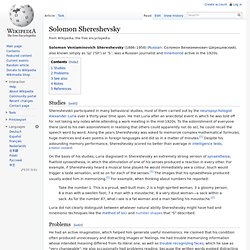
Studies[edit] Shereshevskii participated in many behavioral studies, most of them carried out by the neuropsychologist Alexander Luria over a thirty-year time span. He met Luria after an anecdotal event in which he was told off for not taking any notes while attending a work meeting in the mid-1920s. Mnemonist. The title mnemonist (derived from the term mnemonic) refers to an individual with the ability to remember and recall unusually long lists of data, such as unfamiliar names, lists of numbers, entries in books, etc.
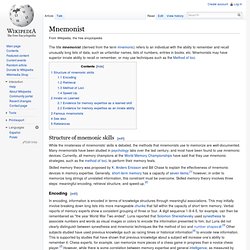
Mnemonists may have superior innate ability to recall or remember, or may use techniques such as the Method of loci. Structure of mnemonic skills[edit] Creativity linked to mental health. New research shows a possible explanation for the link between mental health and creativity.
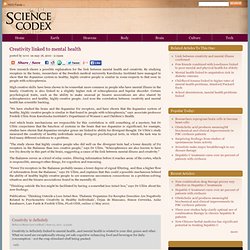
By studying receptors in the brain, researchers at the Swedish medical university Karolinska Institutet have managed to show that the dopamine system in healthy, highly creative people is similar in some respects to that seen in people with schizophrenia. High creative skills have been shown to be somewhat more common in people who have mental illness in the family. Creativity is also linked to a slightly higher risk of schizophrenia and bipolar disorder. Certain psychological traits, such as the ability to make unusual pr bizarre associations are also shared by schizophrenics and healthy, highly creative people.
And now the correlation between creativity and mental health has scientific backing. "The study shows that highly creative people who did well on the divergent tests had a lower density of D2 receptors in the thalamus than less creative people," says Dr Ullén. Orwellian. "Orwellian" is an adjective describing the situation, idea, or societal condition that George Orwell identified as being destructive to the welfare of a free and open society.
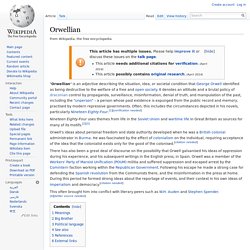
It denotes an attitude and a brutal policy of draconian control by propaganda, surveillance, misinformation, denial of truth, and manipulation of the past, including the "unperson" – a person whose past existence is expunged from the public record and memory, practised by modern repressive governments. Often, this includes the circumstances depicted in his novels, particularly Nineteen Eighty-Four.[1][verification needed] Nineteen Eighty-Four uses themes from life in the Soviet Union and wartime life in Great Britain as sources for many of its motifs.[2][3] Orwell's ideas about personal freedom and state authority developed when he was a British colonial administrator in Burma.
This often brought him into conflict with literary peers such as W.H. Meanings[edit] Big Brother[edit] Political language[edit] Nous. This article is about a philosophical term.
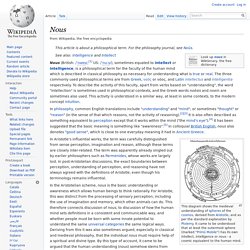
For the philosophy journal, see Noûs. In philosophy, common English translations include "understanding" and "mind"; or sometimes "thought" or "reason" (in the sense of that which reasons, not the activity of reasoning).[2][3] It is also often described as something equivalent to perception except that it works within the mind ("the mind's eye").[4] It has been suggested that the basic meaning is something like "awareness".[5] In colloquial British English, nous also denotes "good sense", which is close to one everyday meaning it had in Ancient Greece. This diagram shows the medieval understanding of spheres of the cosmos, derived from Aristotle, and as per the standard explanation by Ptolemy. It came to be understood that at least the outermost sphere (marked "Primũ Mobile") has its own intellect, intelligence or nous - a cosmic equivalent to the human mind.
Pre-Socratic usage[edit] The World As I See It – An Essay By Albert Einstein. Einstein at his home in Princeton, New Jersey.
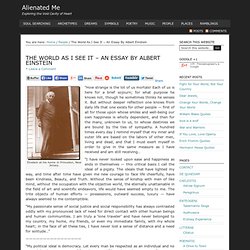
“How strange is the lot of us mortals! Each of us is here for a brief sojourn; for what purpose he knows not, though he sometimes thinks he senses it. But without deeper reflection one knows from daily life that one exists for other people — first of all for those upon whose smiles and well-being our own happiness is wholly dependent, and then for the many, unknown to us, to whose destinies we are bound by the ties of sympathy.
A hundred times every day I remind myself that my inner and outer life are based on the labors of other men, living and dead, and that I must exert myself in order to give in the same measure as I have received and am still receiving… “I have never looked upon ease and happiness as ends in themselves — this critical basis I call the ideal of a pigsty. “My political ideal is democracy. “The most beautiful experience we can have is the mysterious. What are those white dots crawling around? Synesthete.